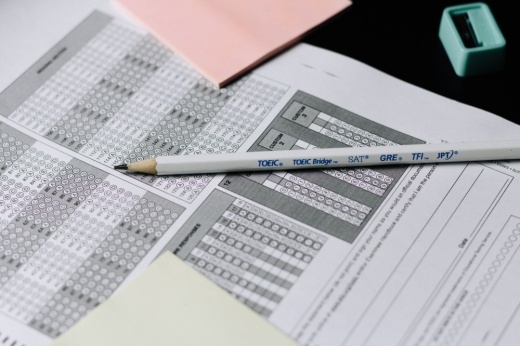The new data breaks down the performance of students in grades 3-12 who took the State of Texas Assessments of Academic Readiness this spring. Students in grades 3-8 are tested on math and reading. Fifth graders also take a science exam, while eighth graders are tested on science and social studies.
High school students are tested on algebra I, biology, U.S. history, English I and English II.
Students improved from 2021 in nearly all areas, but test performance was still below prepandemic levels in some subjects.
In math, 40% of students met or exceeded the expectations for their grade level this year, compared to 35% the previous year. However, 50% of students met or exceeded expectations in 2019.
In reading and language arts, 52% of students met or exceeded expectations, which was an improvement from both 2021 and 2019. Reading and language arts were not seriously impacted by the pandemic, according to TEA.
Fifth and eighth graders improved upon their 2021 scores in science and social studies.
“The investments that the state is making in reading academies and accelerated instruction are clearly paying dividends for our students, and the results are a testament to the hard work of teachers across our state,” TEA Commissioner Mike Morath said in a news release. “While we still have much work to do to recover from COVID-[19-]related learning loss in mathematics, the improvements our students have made in reading are clear.”
STAAR exams were canceled in 2020, due to the challenges of the pandemic.
Disparities persist between groups
Lower-income students tend to have more trouble meeting expectations for their grade levels, according to the data shared by the TEA.
Roughly 30% and 41% of low-income students met or exceeded expectations in math and reading, respectively. Meanwhile, higher-income students performed significantly better, with 55% meeting or exceeding expectations in math and 67% in reading.
Among racial and ethnic groups, more Asian students met or exceeded expectations in both reading, at 81%, and math, at 77%, than other groups. African American students had the lowest scores on average, with 40% of students meeting or exceeding expectations in reading and 25% in math.
Officials from the TEA were not available for comment about the performance gaps between students as of July 11.
House Bill 4545 was adopted in 2021 to provide support for students who do not pass the STAAR tests. The bill requires students have the opportunity to receive 30 hours of targeted instruction for any STAAR subjects they failed.
The STAAR exams will be entirely online by spring 2023, as required by House Bill 3906. The overall assessment process will also undergo changes for the 2022-23 school year, including more frequent feedback for students and wider instruction that is not based solely on test preparation.
Changes to the process are not meant to alter the difficulty of the exam.





